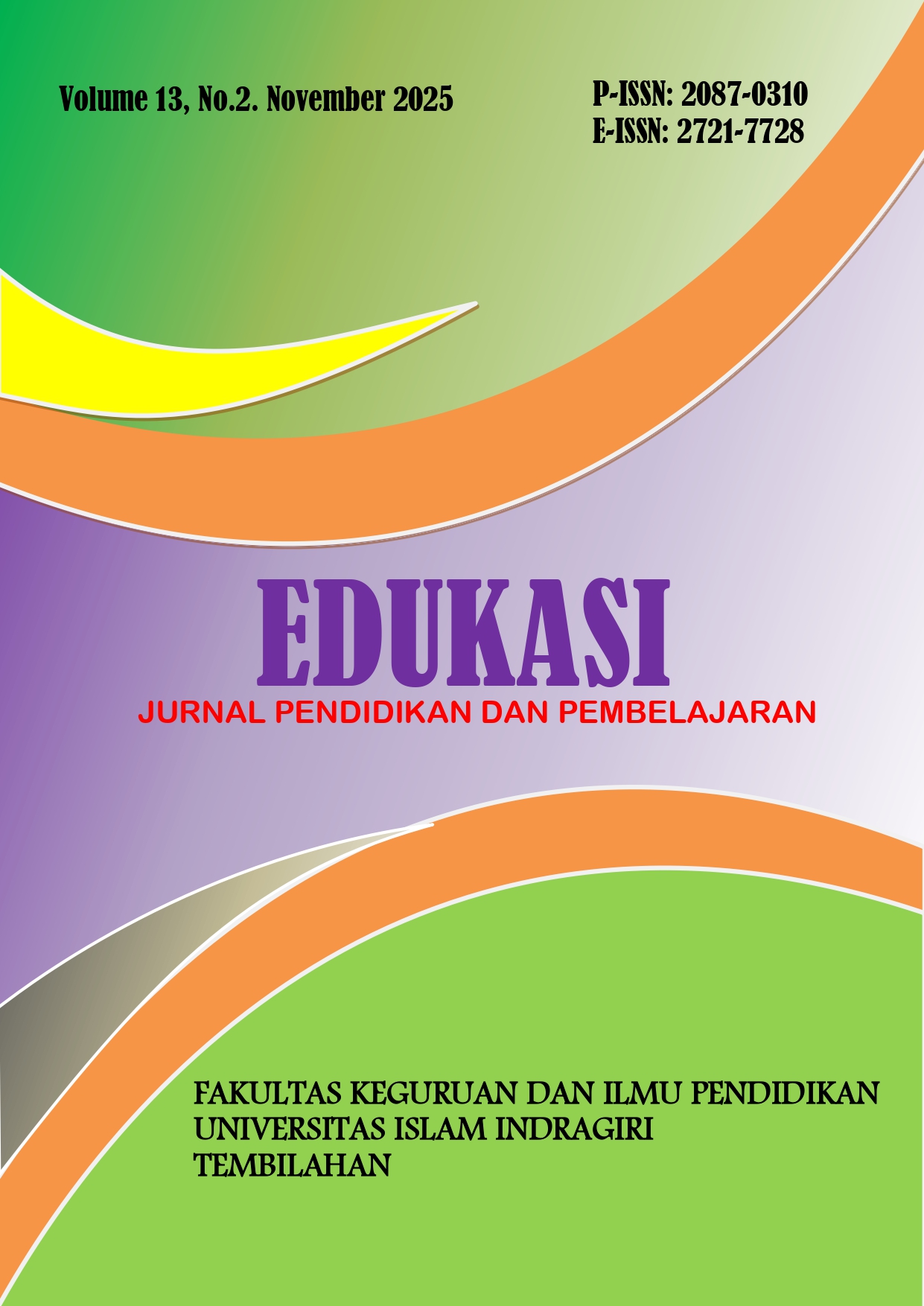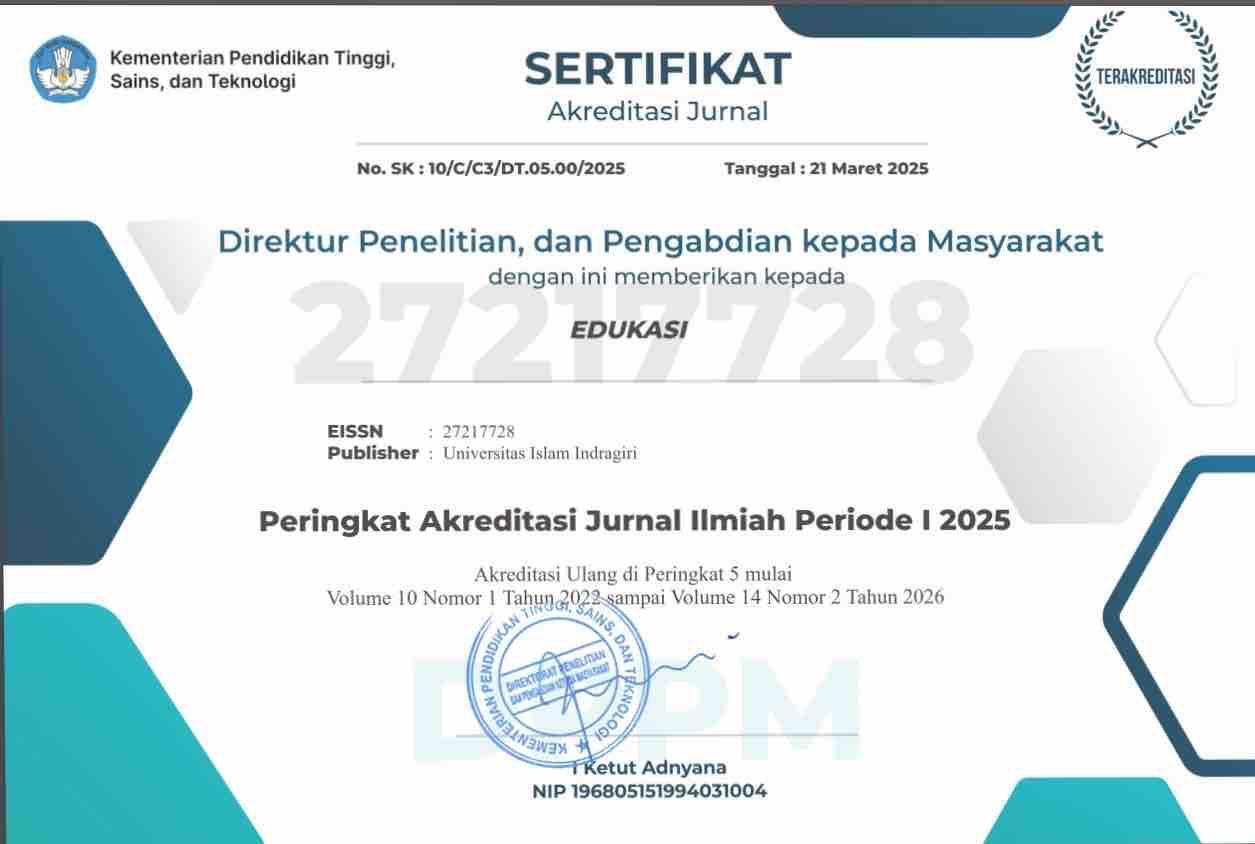A Descriptive Study of the Relationship Between Learning Motivation and Fiqh Performance at MI Darul Quran
DOI:
https://doi.org/10.61672/judek.v13i2.3005Keywords:
: motivasi belajar, hasil belajar, , pendidikan Fiqih, madrasah Islam, motivasi intrinsik, , strategi pembelajaran, , keterlibatan siswa.Abstract
Fiqh, as a core subject in Islamic education within Indonesian madrasahs, plays a vital role in shaping students’ moral reasoning and Islamic character. However, academic outcomes in this subject often do not meet expected standards, with learning motivation frequently identified as a major contributing factor. This study explores the relationship between students’ learning motivation and their academic performance in Fiqh at MI Darul Quran, Sawangan, Depok. Utilizing a quantitative descriptive approach, the research analyzed responses from 93 sixth-grade students through separate instruments: a Likert-scale motivation questionnaire and end-of-semester Fiqh scores. The findings reveal that while 92% of students exhibited high levels of learning motivation—particularly intrinsic motivation—only 18.27% achieved high academic performance in Fiqh. This disparity suggests that motivation alone is insufficient for academic success and highlights the importance of integrating effective pedagogical strategies, teacher involvement, family support, and contextual learning environments. The study underscores the need for holistic instructional models that bridge motivation with cognitive outcomes, offering practical implications for improving Islamic education in primary-level madrasahs. Future research is recommended to employ paired-data designs to better understand the causal relationship between motivational and academic variables.
Downloads
References
Amrullah, M. (2023). Peningkatan Pemahaman Materi Fiqih melalui Model Pembelajaran Langsung pada Siswa Madrasah Ibtidaiyah. ALFIHRIS: Jurnal Inspirasi Pendidikan, 1(1), 237-245. https://doi.org/10.59246/alfihris.v1i1.1326
Bae, S. M. (2015). The relationships between perceived parenting style, learning motivation, friendship satisfaction, and the addictive use of smartphones with elementary school students of South Korea: Using multivariate latent growth modeling. School Psychology International, 36(5), 513-531. https://doi.org/10.1177/0143034315604017
Bustomi, A., Ehwanudin, E., & Irhamudin, I. (2025). The role of the ustadz in improving the understanding of Fiqh of students Class 6 at Ibtidaiyyah Islamic Darul Falah. International Journal on Advanced Science, Education, and Religion, 8(1), 482-492. https://doi.org/10.33648/ijoaser.v8i1.876
Chiappetta-Santana, L., Jesuíno, A., & Lima-Costa, A. (2022). Learning motivation, socioemotional skills and school achievement in elementary school students. Paidéia (Ribeirão Preto), 32, e3232. https://doi.org/10.1590/1982-4327e3232
Cho, I.-H., Yeo, J.-H., Hwang, G.-H., & Yang, H.-H. (2022). Impact of a virtual environment on the learning effectiveness, motivation, cognitive load, and group self-efficacy of elementary school students in collaborative learning. Educational Technology Research and Development, 70(5), 1235–1256. https://doi.org/10.1007/s11423-022-10159-z
Conesa, P. J., Onandia-Hinchado, I., Duñabeitia, J. A., & Moreno, M. Á. (2022). Basic psychological needs in the classroom: A literature review in elementary and middle school students. Learning and Motivation, 79, 1–22. https://doi.org/10.1016/j.lmot.2022.101819
Nufus, U., Somantri, S., & Munawaroh, M. (2023). Upaya guru dalam meningkatkan motivasi belajar siswa pada mata pelajaran Fiqih di MI Nu Al Ma’arif Penpen Kecamatan Mundu Kabupaten Cirebon. Change Think Journal, 2(01), 09-17.
Gordeeva, T. O., Sychev, A., Pshenichnuk, D. V., & Sidneva, A. N. (2018). Academic motivation of elementary school children in two educational approaches—innovative and traditional. Psychology in Russia: State of the Art, 11(4), 19-36.
https://doi.org/10.17323/1814-9545-2022-1-75-97
Hafizah, N. (2024). The role of teachers in enhancing students'understanding of fiqh material at MA Muallimin NW Gunung Rajak. Journal of Education, Teaching, and Learning, 1(3),108-114. https://www.journal.formadenglishfoundation.org/index.php/edutecle/article/view/96
Jamhuri, M. (2017). Upaya pendidikan madrasah diniyah dalam meningkatkan prestasi belajar siswa pada materi Fiqih di Madrasah Diniyah Miftahul Ulum Pruten Ngembal Pasuruan. Jurnal Al-Murabbi, 2(2), 311-324. https://jurnal.yudharta.ac.id/v2/index.php/pai/article/view/609
Lisnawati,L. (2024). Strategi Pengajaran Fikih pada Siswa Madrasah Ibtidaiyah di MI Datarbungur . Karakter : Jurnal Riset Ilmu Pendidikan Islam, 1(3), 112–122. https://doi.org/10.61132/karakter.v1i3.800
Mario, M. (2023). Faktor Pendorong Prestasi Belajar Peserta Didik SD Makassar. PUSTAKA: Jurnal Bahasa dan Pendidikan, 3(1), 150-170.
Rifa’i, M. K. (2019). Madrasa teacher's SWOT in growing the spirit of learning Fiqh in millenial generation in Tulungagung. Al'Adalah, 22(2), 117-135. https://doi.org/10.35719/aladalah.v22i2.16
Solikah, I. (2025). Pendekatan Gamifikasi Dalam Pembelajaran Fiqih Untuk Meningkatkan Antusiasme Siswa. Sasana: Jurnal Pendidikan Agama Islam, 3(2), 164–170. https://doi.org/10.56854/sasana.v3i2.453
Suhandi (2023). Upaya guru dalam meningkatkan motivasi belajar peserta didik mata pelajaran Fiqih di MI Al-Wasillah. Unisan jurnal: jurnal manajemen dan Pendidikan, 2(5),446-453. https://journal.an-nur.ac.id/index.php/unisanjournal
Sunu, S., & Baidoo-Anu, D. (2023). Relationship between students’ academic self-concept, intrinsic motivation, and academic performance. International Journal of School & Educational Psychology, 12(1), 41–53. https://doi.org/10.1080/21683603.2023.2292033
Turyadi.,Adib, A., & Fitria, N. (2024). Peran guru fiqih dalam meningkatkan motivasi belajar peserta didik di pondok pesantren Al Falah Putak Gelumbang Muara Enim Sumatra Selatan. UNISAN JURNAL, 3(5), 411-421.
Umar, A. F. F., Yusuf, A. I., Amini, A. R., & Alhadi, A. (2023). Pengaruh Motivasi Belajar Terhadap Peningkatan Prestasi Akademik Siswa: The Influence of Learning Motivation on Increasing Student Academic Achievement. Wacana: Jurnal Bahasa, Seni, dan Pengajaran, 7(2), 121-133. https://doi.org/10.29407/jbsp.v7i2.20670
Utami, D. S., Putri, S. A., Suriansyah, A., & Cinantya, C. (2024). Pentingnya Motivasi dalam Meningkatkan Hasil Belajar Peserta Didik Sekolah Dasar. MARAS: Jurnal Penelitian Multidisiplin, 2(4), 2071-2082.
Permendikbud No. 23 Tahun 2016 tentang Standar Penilaian Pendidikan. https://peraturan.bpk.go.id/Details/224434/permendikbud-no-23-tahun-2016
Virgantoro, E. D., & Rofiqi, M. A. (2025). Meningkatkan prestasi dan hasil belajar siswa pada fase a. Jurnal Ilmiah Research Student, 2(1), 442-456. DOI:10.61722/jirs.v2i1.3699
Widiastuti, Y. (2016). Analisis faktor-faktor yang mempengaruhi prestasi belajar akuntansi. Journal of Accounting and Business Education, 1(3), 92406.
Wulandari, A. S., & Ernandi, D. (2024). Analisis faktor-faktor yang mempengaruhi prestasi akademik siswa sekolah dasar. Jurnal Kajian Pendidikan, 6(3).
Zainudin, A. (2022). Pengaruh motivasi belajar terhadap keberhasilan belajar siswa. FAJAR Jurnal Pendidikan Islam, 2(2), 231-237. https://doi.org/10.56013/fj.v2i2.2650








